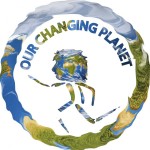- DETERRENCE: North Korea threatens Britain over ‘Mud-Slinging’ Channel 4 Thriller Focusing on Kim Jong-un’s Nuclear Weapons Program
- DPRK: Toward and Effective and Sustainable Inter-Korean Relations Policy
- GOVERNANCE AND CIVIL SOCIETY: Proposal made for Asian Human Rights Court
- CLIMATE CHANGE ADAPTATION: Small Island Developing States and IPCC’s Fifth Assessment Report
- ENERGY SECURITY: Justices Uphold Emission Limits on Big Industry
- AUSTRAL PEACE AND SECURITY: Losing the “Forgotten War”: The U.S. Strategic Vacuum in Afghanistan, Pakistan, and Central Asia
DETERRENCE: North Korea threatens Britain over ‘Mud-Slinging’ Channel 4 Thriller Focusing on Kim Jong-un’s Nuclear Weapons Programme, J. Denham, The Independent, September 2, 2014
Nuclear war is still an imaginary act. The borderline between the imagined first strike, the imagined retaliation, and the real world is ambiguous. Bots may patrol this boundary. Some people are not sure if they are in the real world or the imaginary world of nuclear war.
- Troops guarding America’s nuclear missile silos getting upgrades, Dan Lamothe, Washington Post, September 5, 2014
- Battle Robots to Guard Russian Missile Silos by 2020, The Moscow Times, August 18, 2014
- Russian Navy Will Have Robots Manning New Submarines, The Moscow Times, June 17, 2014
DPRK: Toward and Effective and Sustainable Inter-Korean Relations Policy. Gi-Wook Shin, David Straub, Joyce Lee, Shorenstein Asia-Pacific Research Center (September 2014).
How best to engage North Korea, if there is an external desire to engage North Korea? North Korea’s Minister of Foreign Affairs participated in the United Nations General Assembly for the first time in almost two decades. North Korea denied inviting UN Secretary General, reiterated their positions on returning to the Six Party Talks and most other discussions of their nuclear program, and said they are ready to discuss human rights, of course with some serious caveats. It was a refreshing change, but it is unclear if this was a temporary set of tactics or a sustained change in the relationship North Korea wants with the world.
- North Korea proposes ‘one country, two systems’ reunification. Enews Channel Africa. (28 September 2014)
- N. Korea ends speculation over UN chief invite to Pyongyang. Baik Sungwon, VOAnews(22 September 2014)
- NKorea tells UN it’s ready to discuss human rights. Associated Press Big Story. (27 September 2014)
 GOVERNANCE AND CIVIL SOCIETY: Proposal made for Asian Human Rights Court, Hankyoreh (30 September 2014)
GOVERNANCE AND CIVIL SOCIETY: Proposal made for Asian Human Rights Court, Hankyoreh (30 September 2014)
The top ROK judge proposed the establishment of an Asian human rights court as a means of promoting integration in the region in consideration of Asia’s troubled human rights past. The establishment of such a body is unlikely however, given the stark differences in historical viewpoints in the region. The UN’s top envoy on racism is looking at discrimination in the ROK for a report to be published next year.
- Top judge proposes court for Asia, Ser Myo-ja, Joongang Ilbo (30 September 2014)
- UN racism envoy puts South Korea’s reputation for prejudice to the test, AFP (30 September 2014)
 CLIMATE CHANGE ADAPTATION: Small Island Developing States and IPCC’s Fifth Assessment Report, Elizabeth Carabine and Mairi Dupar, CDKN and Overseas Development Institute, UK (August 2014) [4.87 MB, PDF]
CLIMATE CHANGE ADAPTATION: Small Island Developing States and IPCC’s Fifth Assessment Report, Elizabeth Carabine and Mairi Dupar, CDKN and Overseas Development Institute, UK (August 2014) [4.87 MB, PDF]
Given the interdependence among countries in today’s world, the impacts of climate change on resources or commodities in one place will have far-reaching effects on prices, supply chains, trade, investment and political relations in other places. Thus, climate change will progressively threaten food security and economic growth in complex ways across the world.
- Summary for Policy Makers, Working Group III Contribution to the Fifth Assessment Report, Intergovernmental Panel on Climate Change – IPCC (2014) [2.04 MB, PDF]
- Climate Change 2014: Impacts, Adaptation and Vulnerability, Working Group II Contribution to the Fifth Assessment Report, Intergovernmental Panel on Climate Change – IPCC (2014) [8.68 MB, PDF]
ENERGY SECURITY: Justices Uphold Emission Limits on Big Industry, Adam Liptakjune, New York Times (23 June 2014)
The glass is half full and half empty, or reporters’ glasses are half foggy and half sooty. The Times is relieved that the Supreme Court justices “uphold” emission limits, the Post cautions that they “limit” EPA’s authority. Justice Scalia says, “We are not willing to stand on the dock and wave goodbye as EPA embarks on this multiyear voyage of discovery.” The Supreme Court will be as busy as the Congress and the Administration leave the public to want answers only it can provide. For now, the Court has denied a blank check.
- Justices limit existing EPA global warming rules, Associated Press via Washington Post (23 June 2014)
- Tread carefully with greenhouse-gas regulations, Court warns EPA, Daniel Fisher, Forbes (23 June 2014)
- Slip Opinion: Utility Air Regulatory Group v. Environmental Protection Agency et al. (No., 12-1146, and other cases jointly decided 12-1248, 12-1254, 12-1268, 12-1269, and 12-1272), October Term 2013 (23 June 2014)
AUSTRAL PEACE AND SECURITY: Losing the “Forgotten War”: The U.S. Strategic Vacuum in Afghanistan, Pakistan, and Central Asia, Anthony H. Cordesman, CSIS (26 September 2014)
It’s “déjà vu, all over again”. Australia, sans parliamentary debate on strategy or legitimacy, has deployed 600 personnel to Iraq via Al Minhad AFB in the UAE – on top of the 800 already present – and only awaits Iraqi SOFA sign off. US missile strikes in Syria are alleged to have killed civilians. And US strategists contemplating Afghanistan’s “decent interval” recommend “strategic triage” – i.e. dump the $800 billion 13 year war in Afghanistan and Pakistan, and get back to Iraq – and Syria.
- War in Iraq and the need for a parliamentary debate, Scott Ludlam, The Strategist (19 September 2014)
- Al Minhad Air Base, Australian Bases Abroad, Nautilus Institute
- US/Syria: investigate possible unlawful US strikes – at least 7 civilians dead; residents say no evident military target, Human Rights Watch, (28 September 2014)
The Nautilus Peace and Security Weekly Report presents articles and full length reports each week in six categories: Austral security, nuclear deterrence, energy security, climate change and security, the DPRK, climate change adaptation and governance and civil society. Our team of contributors carefully select items that highlight the links between these themes and the three regions in which our offices are found—North America, Northeast Asia, and the Austral-Asia region.
- Subscribe to NAPSNet to receive free weekly email reports.
- Reports Editor: Frederica Kreitzer
Contributors:
- Deterrence: Peter Hayes
- DPRK: Roger Cavazos
- Governance and Civil Society: Dyana Mardon
- Energy Security: Nikhil Desai
- Climate Change Adaptation: Saleem Janjua
- Austral Peace and Security: Richard Tanter

